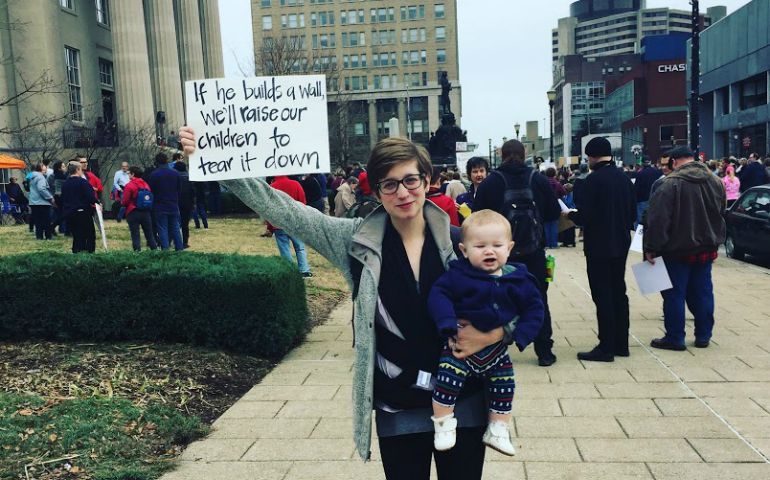
Gillian Mocek holds her son, Simon, and a sign that shares her family's plan for his future, at the Women's March in Louisville, Kentucky, Jan. 21, 2017. (Christian Mocek)
"That's not Muslim garb, is it?" he said, sitting high in his black Suburban.
Sheepishly, my wife and I both responded in unison, "I'm sorry, what did you say?"
"That's not Muslim garb, is it?" he repeated, to our dismay.
"No," we said, faces scrunched in disbelief.
"OK, good," he responded. "I'll go look it up online then."
My wife and I had just spent an evening walking along the beach in Hilton Head, South Carolina, with our son. My wife was carrying him in her Tula baby carrier, which is a cloth sling that supports the baby so that he is easier to carry. The man in the black Suburban stopped us on our walk to inquire about it.
He shared that he would like one to carry his dog. I was surprised, but I couldn't help but think of Pope Francis' infamous words, "Who am I to judge?"
My wife kindly explained that it was a Tula baby carrier and that our son liked it very much. She assured the man that his dog would enjoy it as well. Confused about the brand name of the carrier, he laughingly responded with, "That's not Muslim garb, is it?"
The ease with which those words flowed from his mouth still makes me uncomfortable weeks later. However, the question my wife posed immediately after the man drove away troubles me even more.
"What if it was Muslim garb?" she asked. "What would we have said to him?"
I've thought a lot about this incident since it happened. One thing I don't understand is why he thought that my wife and I were people he could joke with in such a way. I've been thinking, "Do we give off a vibe of intolerance?" I don't think we do, but I do think that people have become more emboldened in their bias.
The Southern Poverty Law Center claims that anti-Muslim hate groups grew from 34 in 2015 to 101 in 2016. This growth was matched by a 67-percent spike in hate crimes against Muslims from 2014 to 2015. These numbers resemble what happened after the terrorist attacks on September 11, 2001, and reflect the country's dramatic shift to the right in the waning years of Barack Obama's presidency.
These numbers are also correlated, and some might argue directly attributed, to the rhetoric of the 45th president of the United States, Donald Trump. The one who wrongfully claimed that President Barack Obama was Muslim. The one who said he would "strongly consider" closing mosques. The one who said that Syrian refugees could "make a Trojan horse look like peanuts." And the one who said he would "think about" creating a database of all the Muslims in the United States.
To be fair, he also did say that he wasn't ruling out a database for all Muslims, but what he wants right now is simply a "database for refugees because we have no idea where they are coming from." This might come as a surprise to the refugees themselves who spent two years or longer waiting to arrive in the United States due to the screening process already in place.
President Trump is not unlike the man in the black Suburban. They both, apparently, have a propensity for insensitive off-the-cuff comments. And the American people are not unlike Gillian and me — caught in a bewildered state wondering if what happened actually just happened.
My personal case of whiplash is starting to wear off, however, and I think that man's question was the start of it. Now I feel as if I am starting to experience what it really means to live in Donald Trump's America.
And I am not the only one. Farmers are starting to realize that migrant workers aren't going to show up to work their fields; families that have peacefully lived in the United States for decades are being ripped apart; the Senate is seriously debating a bill that will leave millions without health insurance; social service agencies are frightened by Trump's proposed budget that will dramatically slash funding for vital safety-net programs; and nonprofits all over the country are concerned that Trump's tax plan will cut charitable giving by $13.1 billion.
The sad truth is that our country elected a man who publicly shames women, who called immigrants fleeing violence in Central America "rapists" — although he did say, "some, I assume, are good people" — and who actually said that "nobody knew healthcare could be so complicated."
Really, who knew?
I'm not ashamed to say that I am sad, angry and tired with the way our country's leaders have talked about our most pressing issues in the age of President Trump. I'm also simply exasperated that some are now concerned that their dogs might be carried around in "Muslim garb."
There is a part of me that wants to find the silver lining in my experience with the man in the black Suburban — but I'm mostly just angry that there are still people in this world who think saying something like that is an acceptable thing to do.
However, Benedictine Sr. Joan Chittister pointed out in her recent article for NCR titled Make America America Again that "we do not have the luxury of depression, of withdrawal or of surrender to our lesser selves as human beings. As long as these attitudes and acts are the mark of the new America, someone must hold fast to the dream, declare it, require it, demand it. And that's us."
So, even in my tired anger, I still have hope. Hope in my ability to raise my son to be nothing like President Trump, hope in my ability to resist hate with love, and hope that Donald Trump's America is not actually America.
[Christian Mocek is the director of alumni relations at St. Meinrad, a Benedictine monastery, seminary and school of theology in southern Indiana. He lives in New Albany, Indiana, with his wife, Gillian, and their little boy, Simon. You can find his reflections on parenthood, marriage and young adulthood at mocekmusings.com.]


